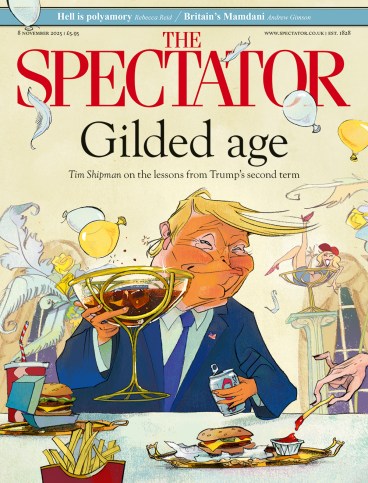
Minimum requirement
Sir: Some of Charles Moore’s observations about the minimum wage are pertinent (Notes, 1 November). However, what many also lose sight of (most of all our Chancellor) is that by government raising the minimum wage, those employees who were just above it usually seek pay rises to stay ahead of it, or employers risk losing those staff. This can then have a ripple effect through the whole organisation. It is another reason the Chancellor’s last Budget had such a profound impact on companies and, in turn, the economy at a delicate time. With employers’ NI rises as well, company cost bases have risen significantly, stifling investment, growth and recruitment and leading to our worsening finances and the tax rises that are now on their way. Her recent delaying of the Budget has also put large parts of the economy on hold. It would be helpful for the UK if the Chancellor could start thinking through all the direct and indirect consequences of her actions.
Andrew Haynes
London SW6
Escaping Maduro
Sir: Daniel McCarthy’s assertion that Venezuela has seen ‘some migration’ of the middle class needs correction (‘Trump vs Maduro’, 1 November). Nearly 7.9 million Venezuelans have fled their homeland (according to the UN Refugee Agency) – surpassing Syria’s displacement and constituting one of the largest migration crises in modern history. Many cross the Darien Gap, a jungle track between Colombia and Panama where migrants face robbery, sexual violence and death. This mass exodus is not the result of an official war, but is due to Nicolas Maduro’s dictatorship. I would accept the characterisation of these millions as ‘freedom-loving’ people – risking one’s life crossing a jungle requires considerable courage. But ‘some migration’ is more than an understatement.
Paola Romero
London NW1
Cast with crew
Sir: I have an idiosyncratic reason for being fond of Mortimer and Whitehouse: Gone Fishing (Arts, 1 November) – it’s just nice to have a fishing programme that has been made with a real budget and production values. Virtually every other fishing show, on TV or online, consists of no more than one man wearing a GoPro. Having a full crew directing multiple cameras and putting proper effort into making the sport look attractive is a real treat. All those aerial shots are also very handy for identifying the sections of river the pair visit, so the rest of us can track down the good spots ourselves.
Robert Frazer
Salford, Lancashire
Hawker of Morwenstow
Sir: Charles Moore’s description of the inventor of the harvest festival, Robert Hawker of Morwenstow, as a ‘great eccentric’ (Notes, 1 November) is apt. He would bring his many cats to church services, once excommunicating one for mousing on the Sabbath; took his pet pig for walks; reputedly dressed as a mermaid to fool observers in Bude Bay; and his belief in demons almost verged on insanity. Yet he also made a hut from driftwood overlooking the Atlantic where he’d watch for shipwrecks, hoping to recover seamen for Christian burial – harvesting souls so to speak – wrote poetry and smoked opium. Visiting it today (it’s the National Trust’s smallest property) reminds one that deep spirituality takes many forms.
Peter Saunders
Salisbury, Wiltshire
Better for birds
Sir: Bob Heddle’s letter (25 October) discusses the Buccleuch estate’s ten-year experiment of continuing grouse shooting over half of the land – with its attendant predator control and heather burning – and what would now be called ‘rewilding’ of the other half. The experiment proved categorically that only on the former did grouse and other wildlife survive. The RSPB (which conducted the survey) perhaps did not get the results they wished for.
Neil Kennedy
Former CEO of the Countryside Business Group, Burnham on Crouch, Essex
Operatic disaster
Sir: If one remark sums up the disaster that is Arts Council England, it’s Richard Bratby’s comment that ideologically motivated cuts have left Liverpool with ‘no regular opera at all’ (Arts, 1 November). It is unimaginable that such a situation would exist in a city of similar size (or even one much smaller) in, for example, Germany. No wonder that is where British musicians and soloists are increasingly going to gain professional fulfilment.
David Woodhead
Leatherhead, Surrey
Ratting hat
Sir: In Matthew Parris’s entertaining article on ‘The lost art of the insult’ (25 October) he mentions an exchange between two MPs in the House of Commons, when Tim Sainsbury saw Nicholas Soames wearing a tweed hunting outfit and asked: ‘Going ratting, Nick?’ Surely Sir Tim was consciously recalling the anecdote about King Edward VII, who, on seeing a Lord Harris wearing a brown bowler hat at Ascot instead of the traditional top hat, called out to him: ‘Goin’ rattin’, Harris?’
Christine Shuttleworth
London W12
Hex change
Sir: Regarding witchcraft becoming fashionable (‘Hex appeal’, 1 November), against the backdrop of Jacobean hysteria Shakespeare speaks prophetically to our time. In Macbeth, Banquo is disturbed and confused by the witches’ gender fluidity. He says: ‘You should be women,/ And yet your beards forbid me to interpret/ That you are so.’ When the battle’s lost and won, I hope sense will have prevailed.
Sam Finniear
Guildford, Surrey







Comments